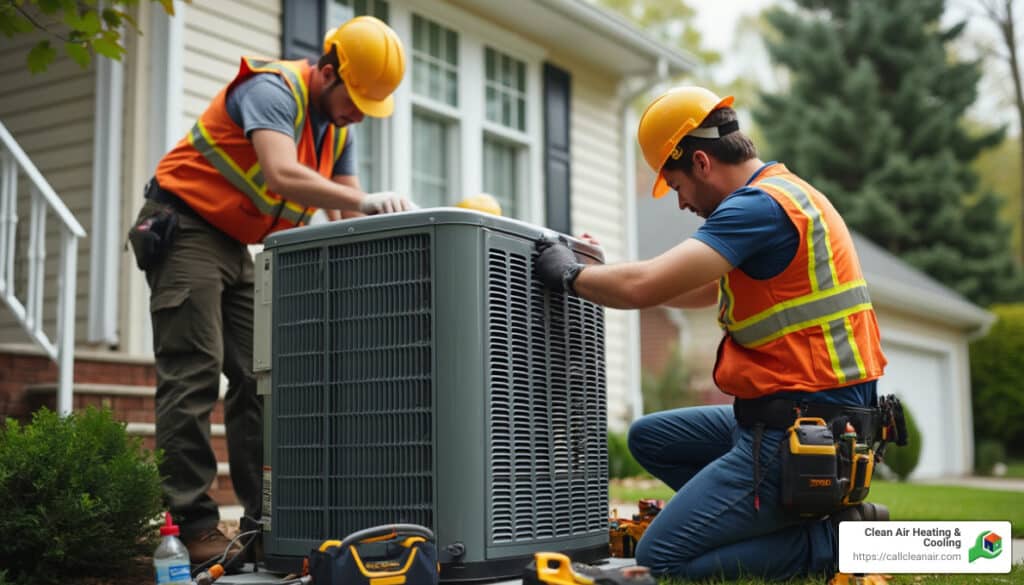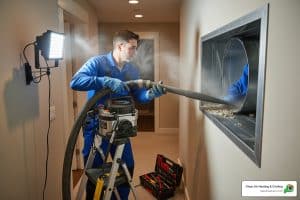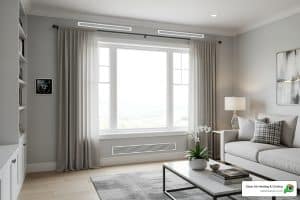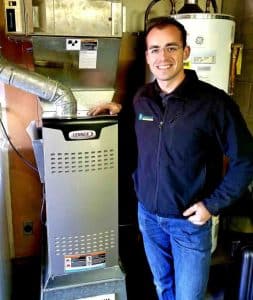When thinking about home comfort and energy efficiency, understanding an estimate for HVAC is crucial. Getting an accurate HVAC estimate allows homeowners to make informed decisions and budget appropriately. Here’s what you need to know:
- Multiple Quotes: It’s wise to gather estimates from several HVAC contractors to compare pricing and services.
- Unit Type: The type of HVAC system impacts cost—consider whether central AC, ductless mini-split, or a heat pump suits your needs.
- Energy Efficiency: Look for units with high SEER ratings to save on long-term energy costs.
- Ductwork Consideration: Using existing ductwork can reduce costs significantly.
- Timing: Off-season installations may come with discounts from HVAC professionals.
Understanding these key areas before diving into an HVAC project helps minimize surprises, ensuring you balance initial costs with long-term savings.
I’m Colin Matei, owner of Clean Air Heating & Cooling. With a wealth of experience in HVAC systems, my focus is on delivering precise and reliable estimate for HVAC services to ensure comfort and peace of mind for homeowners.

Factors Affecting HVAC Estimates
When you’re diving into HVAC systems, understanding what drives the cost of an estimate for HVAC is important. Here are some key factors that impact your HVAC estimate:
HVAC Unit Type
The type of HVAC unit you choose is a major factor in your estimate. Options include:
- Central AC: Ideal for cooling an entire home using ductwork. Costs vary based on size and efficiency.
- Ductless Mini-Split: Offers flexibility for homes without ducts, allowing for room-specific temperature control.
- Furnace and Heat Pump: These provide heating and sometimes cooling. Heat pumps are more efficient in milder climates.
- Boiler: Often used for heating in colder climates, boilers may require more upfront investment.
- Packaged Systems: Combine heating and cooling in one unit, typically used in areas with limited space.
House Size
Your home’s square footage directly affects the size of the HVAC system needed. Larger homes require systems with more BTUs (British Thermal Units) or tonnage to effectively heat or cool the space. For example, a 2,000 sq ft home may need a unit with around 34,000 BTUs.
Energy Efficiency
Energy-efficient systems can save you money over time, even if they cost more initially. Look for:
- SEER Rating: Higher SEER ratings mean better energy efficiency for air conditioners.
- AFUE Rating: Indicates furnace efficiency. Higher ratings mean more efficient fuel use.
- Tax Credits and Rebates: High-efficiency systems may qualify for federal tax credits or local rebates, reducing overall costs.
Labor Costs
Labor is a significant part of any HVAC estimate. Consider:
- Installation Labor: The complexity of the installation affects labor costs. More intricate systems or difficult installations (like in attics) may cost more.
- Hourly Rates: Rates can vary by region and contractor experience.
- Permits and Disposal: Local regulations may require permits, and removal of old systems can add to costs.
Additional Costs
Beyond the basics, additional features can increase your estimate:
- Ductwork: If your home lacks ducts, installing them will add to the cost.
- Upgrades: Smart thermostats, zoning systems, or air quality improvements (like humidifiers or dehumidifiers) can improve comfort but increase expenses.

Understanding these factors can help you get a clearer picture of your HVAC estimate. As you steer through your options, balancing initial costs with long-term savings is key.
How to Calculate an HVAC Estimate
Calculating an estimate for HVAC isn’t as daunting as it might seem. By breaking it down into simple steps, you can get a good idea of what your HVAC system might cost. Let’s explore the process.
Step-by-Step Calculation
1. Square Footage Calculation
Start by measuring the square footage of the area you wish to heat or cool. This is a crucial step because the size of the space directly impacts the size of the HVAC system you need. Larger spaces require more power to maintain comfortable temperatures.
2. BTU Calculation
Once you have the square footage, calculate the required BTUs (British Thermal Units). A general rule of thumb is to allocate 16 to 30 BTUs per square foot for air conditioning and 25 to 50 BTUs per square foot for heating. For example, a 2,000 sq ft home might need around 34,000 BTUs for cooling.
3. Consider Occupant Load
The number of people regularly occupying the space also affects the HVAC load. More people generate more heat, which means you’ll need additional BTUs. Typically, you might add about 600 BTUs per additional person.
4. Factor in Kitchen Load
Kitchens tend to generate extra heat due to appliances. If your HVAC system covers a kitchen area, consider increasing the BTU requirement. A simple way to factor this in is by adding an extra 4,000 BTUs for the kitchen space.
Online Cost Estimators
If manual calculations seem overwhelming, online tools can help. Many websites offer cost calculators where you can input your home’s details to get an estimated cost. These calculators consider factors like square footage, climate, and efficiency ratings.
- Cost Calculators: Input your square footage and other details to get a rough estimate.
- Professional Consultations: For a more precise estimate, consider consulting with a professional. They can assess your home and provide a detailed breakdown of costs.
By following these steps, you can get a clearer picture of what to expect when budgeting for an HVAC system. While online tools are helpful, a professional evaluation will give you the most accurate estimate.
Average Costs of HVAC Systems
When planning for an HVAC system, understanding the average costs can help you budget effectively. Costs vary widely based on system type, house size, and efficiency rating. Let’s break it down.
By System Type
Different systems come with different price tags. Here’s a quick overview:
- Central AC: This is the most common type. It’s efficient for whole-home cooling but can be pricey to install due to ductwork requirements.
- Ductless Mini-Split: Ideal for homes without ductwork, offering flexibility by cooling individual rooms. They’re generally more energy-efficient but have a higher initial cost.
- Furnace: A traditional choice for heating, using gas, oil, or electricity. Installation can be costly due to the need for ductwork.
- Heat Pump: Transfers heat rather than generating it, making it efficient year-round. Initial costs can be high, especially for geothermal models.
- Boiler: Uses water to heat your home, great for radiant floor heating. Costs vary based on the system’s complexity.
- Packaged Systems: Combine heating and cooling in one unit, saving space but often with a shorter lifespan due to outdoor placement.
By House Size
The size of your home significantly impacts the cost:
- 1,000 sq ft: Smaller homes need less powerful systems, keeping costs lower.
- 1,500 sq ft: A moderate size, requiring a mid-range system.
- 2,000 sq ft: Commonly used as a benchmark for average costs, needing more robust equipment.
- 2,500 sq ft: Larger homes demand more powerful systems, increasing costs.
- 3,000 sq ft: Very large spaces require the most powerful and expensive systems.
By Efficiency Rating
Efficiency is key to long-term savings:
- Standard Efficiency: Basic models that meet minimum efficiency standards. They have the lowest upfront cost but may lead to higher utility bills.
- High Efficiency: More efficient systems with better energy usage. They cost more initially but can save money over time.
- Very High Efficiency: Top-tier systems with significant energy savings. High upfront cost but excellent for reducing bills.
- Maximum Efficiency: Cutting-edge technology offering the best efficiency. Ideal for eco-conscious homeowners, though expensive to purchase.
When considering an estimate for HVAC, remember these factors. They not only affect the initial cost but also your long-term savings. Understanding these aspects will help you make a well-informed decision about your HVAC investment.
Tips for Getting Accurate HVAC Estimates
When you’re planning to install or replace an HVAC system, getting an accurate estimate is crucial. Here’s how you can ensure you’re getting the best deal possible.
Comparing Quotes
Getting multiple quotes is essential. Aim for at least three quotes from different HVAC contractors. This helps you understand the market rate and ensures you’re not overpaying. When comparing, make sure each quote includes detailed estimates, such as:
- Equipment Size and Quality: Ensure the quotes are for systems of the same size and efficiency. This helps in making a fair comparison.
- Contractor Credentials: Verify that contractors are licensed, insured, and have experience with the type of system you need.
Avoid choosing the lowest bid without considering these details. Sometimes cheaper quotes might mean lower quality or hidden costs.
Seasonal Considerations
Timing can significantly affect the cost of your HVAC installation. Consider scheduling your project during off-peak seasons, like spring or fall. During these times, demand is lower, and you might find better deals or potential rebates. HVAC companies often offer discounts to fill their schedules, which can save you money.
Regular Maintenance
Regular maintenance is key to extending the lifespan of your HVAC system and reducing long-term costs. Consider these tips:
- Yearly Tune-Ups: Schedule annual check-ups with a professional to keep your system running efficiently. Regular maintenance can prevent costly repairs down the line.
- Maintenance Plans: Some companies offer maintenance plans that include regular inspections and discounts on repairs. These plans can be a cost-effective way to ensure your system stays in top shape.
By following these tips, you’ll be well-equipped to get an accurate and fair estimate for HVAC installations or replacements. This proactive approach not only saves money but also ensures your home remains comfortable year-round.
Frequently Asked Questions about HVAC Estimates
When planning an HVAC installation, understanding how estimates are calculated can help you make informed decisions. Here are answers to some common questions about HVAC estimates:
How do you calculate HVAC estimate?
Calculating an HVAC estimate involves several factors, primarily focusing on your home’s square footage and the BTU (British Thermal Units) needed to heat or cool that space.
- Square Footage: First, measure the total square footage of the area that needs heating or cooling. This is the foundation for determining the system size.
- BTU Calculation: Generally, you’ll need about 16 to 30 BTUs per square foot for air conditioning and 25 to 50 BTUs per square foot for heating. A professional will perform a Manual J Load calculation to assess the specific needs based on factors like climate, insulation, and window placement.
- Additional Loads: Consider any extra heat generated by occupants, kitchens, or appliances. These contribute to the internal load and may require additional BTUs.
How much HVAC do I need for 2000 square feet?
For a 2,000-square-foot home, you’ll need a system that can handle the appropriate tonnage and BTUs. Typically, this size home requires:
- Air Conditioner: Around 34,000 BTUs, translating to about 2.5 to 3 tons.
- Furnace: 50,000 to 100,000 BTUs, depending on your local climate and insulation quality.
Check the HVAC size chart or consult a professional to ensure you’re selecting the right size unit for your specific conditions.
What time of year is the cheapest to replace HVAC?
Timing your HVAC replacement can lead to significant savings. The off-peak seasons—spring and fall—are ideal for scheduling installations. During these periods, the demand for HVAC services is lower, allowing you to take advantage of:
- Lower Demand: Contractors are less busy, which can lead to more competitive pricing.
- Potential Rebates: Some companies offer discounts or promotions during these times to fill their schedules.
By scheduling your HVAC work during these seasons, you can reduce costs and potentially benefit from seasonal offers.
Conclusion
Navigating HVAC estimates can feel complex, but understanding the basics can help you make smart choices. At Clean Air Heating & Cooling, we prioritize transparency and customer satisfaction. Our team is committed to providing clear and accurate estimates custom to your specific needs.
We stand out with our 25% utility savings guarantee, ensuring that investing in a new system will not only improve your comfort but also save you money in the long run. With over 480 5-star Google reviews, our reputation speaks for itself. Our customers appreciate our prompt service and dedication to high-quality work.
When you’re ready to take the next step, consider reaching out for a free estimate. Our team is here to help you understand your options and find the best solution for your home. Visit our HVAC services page to learn more about how we can assist you in achieving a comfortable and energy-efficient home.
Thank you for considering Clean Air Heating & Cooling. We look forward to helping you with your HVAC needs and ensuring your complete satisfaction.





